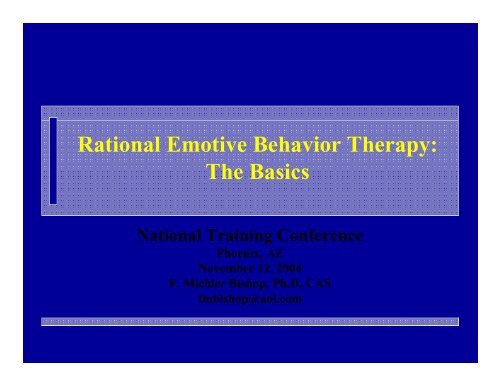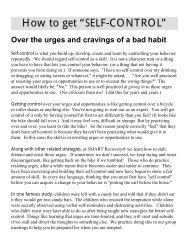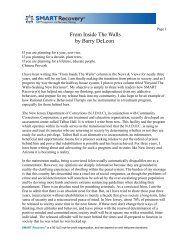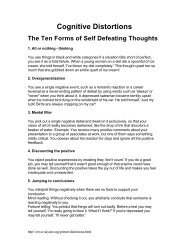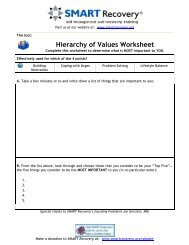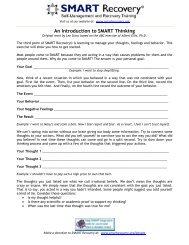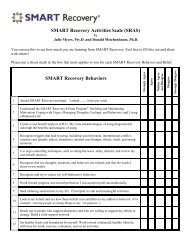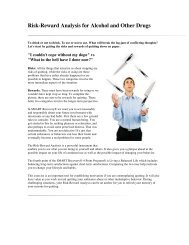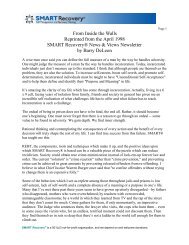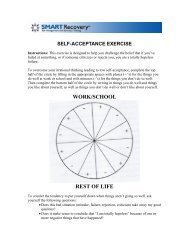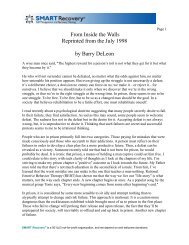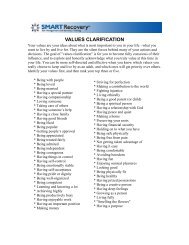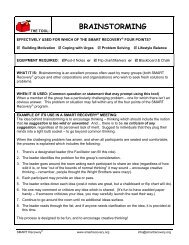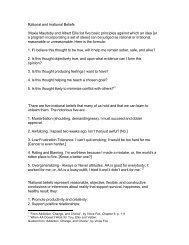Rational Emotive Behavior Therapy: The Basics - SMART Recovery
Rational Emotive Behavior Therapy: The Basics - SMART Recovery
Rational Emotive Behavior Therapy: The Basics - SMART Recovery
You also want an ePaper? Increase the reach of your titles
YUMPU automatically turns print PDFs into web optimized ePapers that Google loves.
<strong>Rational</strong> <strong>Emotive</strong> <strong>Behavior</strong> <strong><strong>The</strong>rapy</strong>:<br />
<strong>The</strong> <strong>Basics</strong><br />
National Training Conference<br />
Phoenix, AZ<br />
NNovember b 12 12, 2004<br />
F. Michler Bishop, Ph.D, CAS<br />
fmbishop@aol.com
REBT: <strong>The</strong> <strong>Basics</strong><br />
� REBT is i a self-help lf hl / self-management lf tt type of f<br />
therapy.<br />
�� REBT is popular because it makes sense to most<br />
people, and they can and do use it.<br />
�� REBT helps them better manage their thoughts<br />
feelings and behaviors, so it is ideal for <strong>SMART</strong><br />
<strong>Recovery</strong>®, y , as well as for ppeople p with multiple, p ,<br />
interacting psychological and addictive problems.
REBT: <strong>The</strong> <strong>Basics</strong><br />
� AAccording di to t REBT, REBT our attitudes, ttit d our<br />
belief, our thoughts -- the way we think<br />
about b tevents t and d the th meanings i we give i to t<br />
them -- directly affect how we feel and<br />
bh behave. This Thiis i commonsense to t most t<br />
people, making REBT more user-friendly<br />
th than other th therapies.<br />
th i
REBT: <strong>The</strong> <strong>Basics</strong><br />
� REBT is i useful f l to t <strong>SMART</strong> <strong>Recovery</strong>® R ® because b<br />
the Institute (see www.rebt.org) offers many self-<br />
help pamphlets, pamphlets books, books tapes, tapes videos, videos pocket pocket-sized sized<br />
cards, etc.<br />
� REBT is also the only cognitive-behavioral<br />
cognitive behavioral<br />
therapy that encourages people to examine their<br />
philosophy of life – their goals, values, etc. -- and<br />
how their philosophy affects their self-help efforts<br />
(see <strong>SMART</strong> <strong>Recovery</strong>’s® Point 4)
REBT: <strong>The</strong> <strong>Basics</strong><br />
�� REBT teaches that even e en though tho gh people are<br />
determined to some extend by their genetic<br />
givens givens, their upbringing upbringing, their family<br />
background, etc., they can change.<br />
�� REBT focuses on techniques rather than<br />
insight. It teaches people how to change.<br />
�� REBT encourages them to accept their<br />
limitations while working on self-change.
REBT: <strong>The</strong> <strong>Basics</strong><br />
On a deeper level, level REBT teaches a profoundly<br />
radical (for some) philosophy:<br />
� Unconditional Self Acceptance (USA)<br />
(Rate your behavior, not your self.)<br />
� Unconditional Other Acceptance p ( (UOA) )<br />
(Rate what others do, but not them.)<br />
Note: This is not a new idea; it is over 2000 years y<br />
old. Christ also preached it (“Judge the sin, not<br />
the sinner.”)
<strong>Rational</strong> <strong>Emotive</strong> <strong>Behavior</strong><br />
<strong><strong>The</strong>rapy</strong>: <strong>The</strong> <strong>Basics</strong><br />
� R = R<strong>Rational</strong> ti l People P l think thi kof f“ “rational” ti l” in i<br />
many ways, for example, reasonable,<br />
hlflf helpful, functional…<br />
ti l
<strong>Rational</strong> <strong>Emotive</strong> <strong>Behavior</strong><br />
<strong><strong>The</strong>rapy</strong>: <strong>The</strong> <strong>Basics</strong><br />
R = R<strong>Rational</strong>... ti l Most M t people l realize li that th t when h<br />
they think more rationally and reasonably,<br />
th their i life lif goes better. b tt So S this thi piece i of f REBT<br />
makes sense to them.<br />
E = <strong>Emotive</strong> Most people understand that<br />
their emotions are affected by what happens<br />
to them and how they think about those<br />
events.
<strong>Rational</strong> <strong>Emotive</strong> <strong>Behavior</strong><br />
<strong><strong>The</strong>rapy</strong>: <strong>The</strong> <strong>Basics</strong><br />
R = <strong>Rational</strong>... R ti l Most M t people l realize li that th t when h they th<br />
think more rationally and reasonably, their life<br />
goes better better. So this piece makes sense to them. them<br />
E = <strong>Emotive</strong> Most people understand that their<br />
emotions are affected by what happens to them<br />
and how they think about those events.<br />
B = <strong>Behavior</strong> Most people accept that what they do<br />
p p p y<br />
(their behavior) affects how they think and feel.
<strong>Rational</strong> <strong>Emotive</strong> <strong>Behavior</strong><br />
<strong><strong>The</strong>rapy</strong>: <strong>The</strong> <strong>Basics</strong><br />
R = <strong>Rational</strong>... Most people realize that when they think<br />
more rationally i ll and d reasonably, bl their h i life lif goes better. b So S<br />
this piece makes sense to them.<br />
E = <strong>Emotive</strong> Most people understand that their emotions<br />
are affected by what happens to them and how they think<br />
about those events.<br />
B = <strong>Behavior</strong> Most people accept that what they do (their<br />
behavior) affects how they think and feel.<br />
T = <strong><strong>The</strong>rapy</strong>…but it can also mean Teaching or Training,<br />
especially p yin the context of <strong>SMART</strong> <strong>Recovery</strong>® y
REBT: <strong>The</strong> <strong>Basics</strong><br />
�� <strong>Rational</strong> – does not t mean cold and<br />
calculating<br />
�� <strong>Rational</strong> thinking<br />
– reflects preferences rather than demands<br />
– is flexible<br />
– is realistic<br />
– is functional functional, helpful, helpful useful -- in terms of<br />
someone’s long-term goals and values
REBT: <strong>The</strong> <strong>Basics</strong><br />
IIrrational ti lthi thinking ki includes: i l d<br />
– demandingness<br />
– inflexibility / rigidity<br />
– awfulizing / catastrophizing<br />
– I-can’t-stand-it-it is (low ( frustration tolerance, , LFT) )<br />
– all-or-nothing thinking<br />
– personalizing<br />
– emotional reasoning
REBT: <strong>The</strong> <strong>Basics</strong><br />
IIrrational ti lthi thinking ki does d not twork kfor f us. It<br />
does not help us obtain our medium and<br />
llong-term t goals<br />
l
REBT’s REBT s ABC(DE) Technique<br />
� A = AActivating ti ti Event E t<br />
� B = Beliefs (both rational and irrational<br />
(IB’s)<br />
� C = Consequences q<br />
� D = Disputing<br />
� E = More Effective ways to think feel and<br />
� E = More Effective ways to think, feel and<br />
behave.
ABC: Part I<br />
MMany people l are A – C people. l<br />
� <strong>The</strong>y believe: “You made me angry.”<br />
� <strong>The</strong>y believe the A – your remark or action<br />
– caused the C, their anger. g<br />
� Your behavior caused their anger.
ABC: Part I<br />
REBT argues, argues no, no their Beliefs Beliefs…between between the A and<br />
the B -- largely determine how they feel.<br />
� A (Activating) – He yelled at me.<br />
� B (Beliefs) – I can’t believe he dared to yell at me<br />
That’s totally unprofessional. He should never<br />
have acted that way. I can’t stand it. I want a<br />
drink (and I have to have what I want when I want<br />
it) it). I can get a way with it. it It won won’t t matter. matter<br />
� C (Consequences) – Anger, drinking, etc.
ABC: Part I<br />
� Th <strong>The</strong> ABC iis th the di diagnostic ti step t in i the th ABC<br />
technique.<br />
� Doing an ABC helps people feel<br />
empowered and more hopeful that they can<br />
understand and, ultimately, control their<br />
own thoughts, feelings and behavior more<br />
effectively.
ABC: Part II<br />
In order to feel and act differently, differently someone doing an<br />
ABC moves on to the D and the E.<br />
D (Disputes) – in this step, you dispute or<br />
question i or challenge h ll your irrational i i l beliefs: b li f<br />
Where is the evidence that no one should ever yell<br />
at me?<br />
Where is it written that a boss must always behave<br />
professionally?<br />
Wh Why iis iit so awful? f l? Why Wh isn’t i ’ just j a “hassle “h l not a<br />
horror?”<br />
Where is the evidence that “It It won’t won t matter.<br />
matter.”
ABC: Part II<br />
E – then they move on to figure out more<br />
EFFECTIVE thoughts, feelings and behaviors<br />
� I don’t like it, but I can stand it.<br />
� Because I really do not like people yelling at me, I<br />
will talk to him later when he calms down. But I<br />
will remember that I don don’tt always get what I want.<br />
� I will try to feel annoyed and determined (to keep<br />
my job) rather than enraged.<br />
� I will ill go exercise i or go to yoga class l tonight i h<br />
because I always think better after I do that.
THE VICIOUS CYCLE OF<br />
IRRATIONAL THINKING<br />
– I deserve better –<br />
poor me!<br />
– I’m such a failure<br />
�Self-pity Slfit or<br />
�Demandin<br />
Self-doubting<br />
g-<br />
ness<br />
�Low<br />
frustration<br />
tolerance �Awfulizing<br />
– I’m worthless! g<br />
– Life shouldn’t be so<br />
hard<br />
– You should be different<br />
– I should be different<br />
– I can’t stand it g<br />
– It’s terrible, awful, unfair<br />
– Negative exaggeration<br />
© Brett Saarela, September 27, 2002<br />
– Negative evaluation<br />
– We “crank it up” on our<br />
scale
HOW TO BREAK THE VICIOUS CYCLE<br />
– I’m such a failure –<br />
I’m worthless!<br />
– Id I deserve bbetter<br />
–<br />
poor me!<br />
�Self-Pity: S f i Practice i<br />
unconditional selfacceptance<br />
�Self-pity or<br />
Self-doubting<br />
�Demandingness<br />
�Self-doubt: Question<br />
your assumptions<br />
ness<br />
– I can’t stand it<br />
– It’s terrible, , awful, , unfair<br />
�Low Low<br />
frustration<br />
tolerance<br />
�Try an ABC<br />
reality check<br />
�Awfulizing<br />
�© Brett Saarela, September 27, 2002<br />
– Life shouldn’t be so hard<br />
– You should be different<br />
– I should be different<br />
�Try �Try “Preferential<br />
Preferential<br />
Thinking”<br />
�Try “combat<br />
your rating”<br />
– Negative exaggeration<br />
– Negative evaluation<br />
– We “crank it up” on our<br />
scale
REBT: <strong>The</strong> <strong>Basics</strong><br />
REBT teaches people tools with which to<br />
better manage our lives:<br />
11. Cognitively – ABC’s ABC’s, reframing reframing, CBA’s<br />
2. <strong>Emotive</strong>ly – REI, shame attacks<br />
3. <strong>Behavior</strong>ally i – role playing, i homework<br />
4. Chemically – medicines, nutrition, etc.<br />
5. Spiritually – meanings, goals, values,<br />
hedonic calculus
Doing an ABC for Urge Coping: Part I<br />
C -- the potential lapse or relapse.
Doing an ABC for Urge Coping: Part I<br />
B -- Work backwards in time.<br />
Identify/uncover y the B’s.<br />
C -- the potential lapse or relapse.<br />
relapse
Typical BB’s s to Watch For<br />
<strong>Rational</strong> and irrational beliefs beliefs, and cognitive distortions<br />
[shoulds, musts, awfulizing, wonderfulizing, LFT (low<br />
frustration tolerance)]<br />
1. I can’t stand what I feel.<br />
2. I deserve it.<br />
3. It’s not fair (poor me). Life should be fair / should be better.<br />
4. I’ll just have two.<br />
5. A drink would help…and I must have what I want now.<br />
6. I can’t stand not going to a prostitute/ gambling/drugging.<br />
7. I can get away with it.<br />
I ’<br />
8. It won’t matter.<br />
9. I’m going to do it anyway, eventually.<br />
10. Screw it.
Doing an ABC for Urge Coping: Part I<br />
A’s -- Identify/uncover the Activating Events<br />
B’ B’s -- WWork kb backwards k d iin time. i<br />
Identify/uncover the Beliefs.<br />
11. It’s It s not fair (i (i.e. e It should be / must be fair). fair)<br />
2. I want a drink (and I should / must have what I want).<br />
3. ?<br />
C -- the potential lapse or relapse.
Potential AA’s s<br />
�� Event(s) /Trigger(s) – real and imagined;<br />
internal and external<br />
� the opportunity to use/drink/etc.<br />
ii<br />
� urges; conditioned responses<br />
� unpleasant emotions<br />
� unpleasant physical sensations<br />
p p y<br />
� pleasant emotions<br />
� pressure from others<br />
� conflict with others<br />
� conflict with others<br />
� socializing<br />
� testing personal control
Doing an ABC for Urge Coping: Part I<br />
A’ A’s -- my girlfriend is on a business trip<br />
B’s --<br />
1. I can get away with it.<br />
2. It won’t matter.<br />
3. I’ll just have two.<br />
4. ?<br />
C’s – feelings of excitement, entitlement, etc;<br />
lapse/relapse p p
Doing an ABC for Urge Coping: Part II<br />
Ask members how they might Dispute the IB’s IB s<br />
Disputes are always questions.<br />
<strong>The</strong>y help you dispute and/or examine the rationality,<br />
validity validity, helpfulness, helpfulness etc. etc of your IB IB’s s.<br />
What do you mean by ‘I can get away with it’?<br />
Where is the evidence you can just have two?<br />
What are your long-term “wants?”
Doing gan ABC for Urge g Coping: p g Part II<br />
Ask Individual Members to Suggest More Effective…<br />
� thoughts, for example, counter-statements to the IB’s:<br />
I may ybe able to get g away y with it tonight, g , but I won’t always, y , and<br />
the tradeoff is not worth it.<br />
� behaviors (things they could DO):<br />
exercise, i fill out t a worksheet, k h t review i your pros and d cons, go to t a<br />
meeting,...<br />
� feelings – self-determination instead of self-entitlement and selffeelings<br />
self determination instead of self entitlement and self<br />
pity; acceptance instead of excitement<br />
…which will increase the likelihood I will remain abstinent.
Dealing with Lapses and Relapses<br />
KEY POINTS POINTS:<br />
� Emphasize acceptance of self with "slips"<br />
� Review --<br />
– the A’s and B’s before the slip p<br />
– the B’s and C’s afterwards<br />
� Rehearse -- Better Ways to Maintain<br />
� Rehearse -- Better Ways to Maintain<br />
Abstinence
General Irrational Beliefs which May Affect How<br />
Well You Function as a Facilitator<br />
�� I must do very well almost all the time time.<br />
� I must have everyone’s approval.<br />
�� People should be different.<br />
� I should be different.<br />
� <strong>The</strong> world should be different.
Specific Irrational Beliefs which May Affect How<br />
Well You Function as a Facilitator<br />
11. I must run a good meeting meeting.<br />
2. I must help people who are in serious trouble.<br />
3. Everyone has to like my meeting.<br />
4. I am losing control of this meeting, as I<br />
mustn’t. It would terrible if I lost control of<br />
this meeting.<br />
5. It would be terrible if other people thought they<br />
could run a better meeting.<br />
N t ifh / h i b d<br />
6. No one must ever appear as if he/she is bored.<br />
7. It would be awful to fail at running good<br />
meetings.


